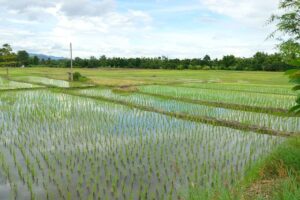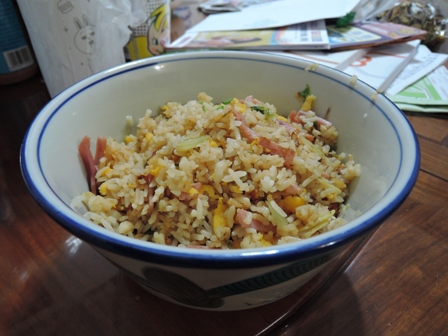The Sustainable Rice Platform (SRP) has launched a label which identifies sustainably-produced rice. The label will help shoppers reduce the environmental impact of rice production by identifying [and buying] such rice.
The SRP gathers over 100 groups who seek to develop a more environmentally-friendly way of production and get a fairer price for their product. In turn, this should increase the global supply of affordable rice and lead to a better standard of living for the rice farmers.
With the support of the United Nations Environment Programme (UNEP) and the International Rice Research Institute (IRRI), the SRP has developed the ‘SRP-Verified’ label to identify such rice producers.
“Rice, wheat, and maize are the world’s three leading food crops; together they directly supply more than 42% of all calories consumed by the entire human population. Of these, rice is the daily staple of over 3.5 billion people, accounting for 19 percent of dietary energy globally.

Yet, the crop has an undeniable environmental impact. Rice farming consumes up to one-third of the world’s developed freshwater resources and generates up to 20% of global anthropogenic emissions of methane, a potent greenhouse gas.”
However, global-warming is having a negative impact on rice production, with the International Food Policy Research Institute estimating that rice production will fall by 15% by 2050.
The SRP hopes that, through more environmentally-friendly production methods they can limit this impact. Through the system they are promoting, they hope to reduce water use by some 20% and methane emissions from flooded rice fields by up to 50%.
“The Assurance Scheme offers supply chain actors a robust, cost-effective and transparent path to sustainable procurement. Consumers are increasingly demanding that food is produced sustainably, and now they have a reliable way to choose environmentally friendly rice,” said Wyn Ellis, SRP Executive Director.
With the new label, consumers will be able to trace the rice back to the country of origin. The scheme will also benefit an entire industry. By stocking SRP-verified rice, retailers can make significant and measurable contributions to sustainability commitments and climate change targets. Industry actors will also be able to de-risk their supply chains and ensure stability by sourcing through SRP-verified suppliers.
Switching over to SRP practices can help farmers boost their net income by 10-20%. With 90% of the world’s 144 million rice producers living on or near the poverty line, this can make the difference between a secure livelihood and a family going hungry. (Source: UNEP)
With thanks to the SRP, UNEP and IRRI.

